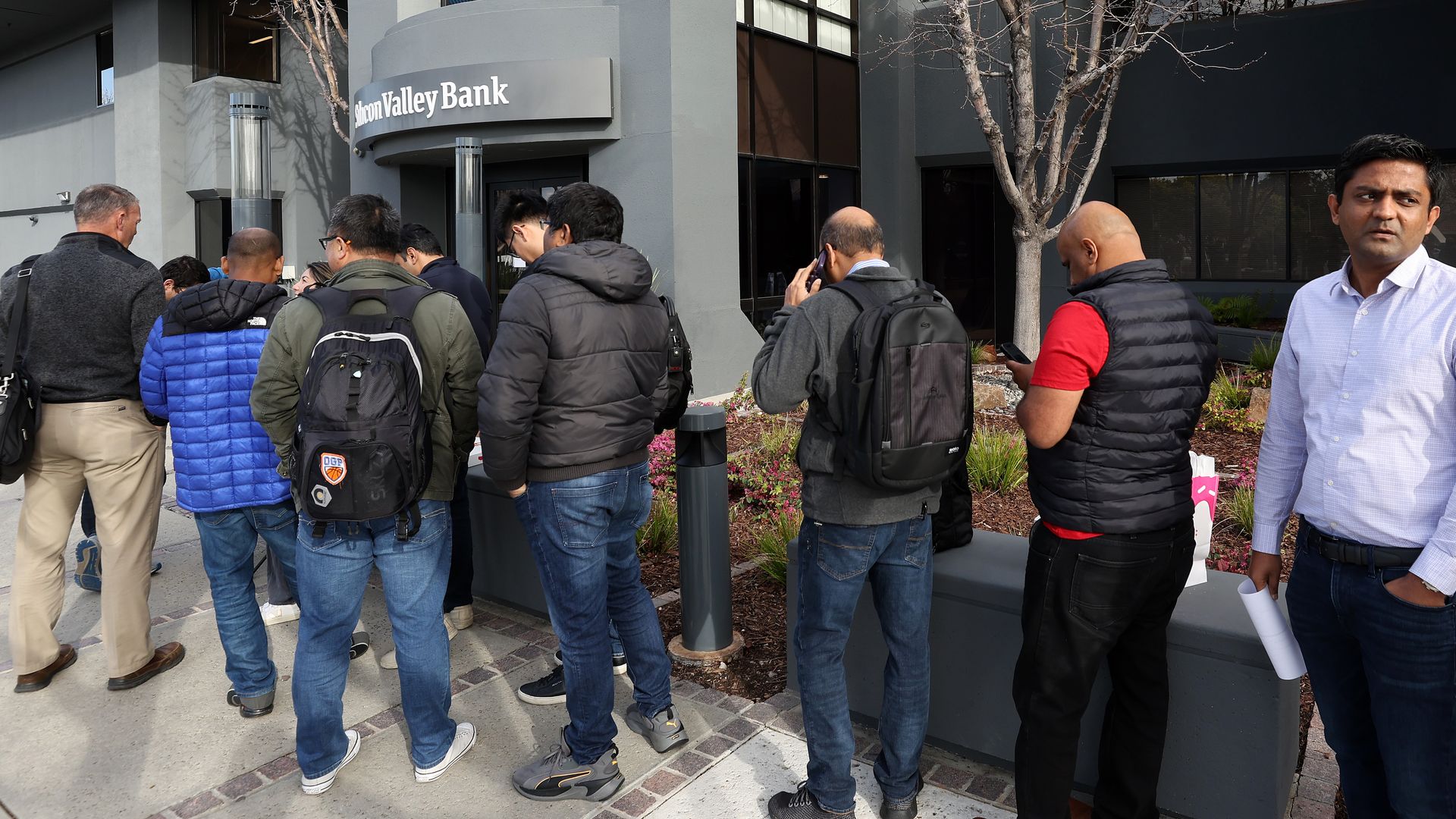
Commentary
-
Our commentary partners will help you reach your own conclusions on complex topics.
The word credit crunch has been in the news a lot. Sounds pretty scary. I mean, anything getting crunched is never a good idea, particularly if you’re a borrower. And you might be worried about whether or not you can access credit or not. Well, let’s put some things in perspective. And also to think about steps you can take. First of all, let me start off with some good news. The problems in the banks are really not as bad so far, at least, as the headlines might make them appear. As of the end of April, commercial and industrial loans at the nation’s banks fell from about 2.8 trillion to 2.76 5 trillion, that’s not very much, it’s about a 1%, decline. collateralized or real estate loans actually went up a little bit. That’s one area of concern. Meanwhile, what funds those deposits? Well, they fill a lot at small banks, they dropped by about 8%. Or let’s call it $300 billion. But that drop seems to have ended at the end of March. And since then, deposits, even small banks have been relatively stable. Remember, deposits fund loans. So we want to make sure that there are enough deposits to cover the nation’s loans that are banks. That’s really not a problem. As of the end of April, deposits of the nation’s banks were 17 point 2 trillion loans were just 12 point 1 trillion. What banks did with the rest of the money, the other 5 trillion, let’s say, is to hold securities, particularly government bonds. Now, it’s usually a good idea for banks to hold such securities, they’re good to meet their capital requirements that the regulator set. They’re also good to meet liquidity requirements that the regulators set. So let’s just imagine that banks want to have at least 20% of their balance sheets be made up of these securities. Even if that were true, the bank still have 2 billion more of deposits than they will need for loans. Excuse me, that’s $2 trillion more than they need for loans, little difference there between billions and trillions isn’t there. That’s six times as much money, as has already left the banks in terms of deposits. And those deposits are leaving largely because they get much higher interest rates elsewhere. banks pay about half a percent. Government Bonds money market funds pay closer to 5%. So that’s why people are leaving, there really doesn’t seem to be the causes for credit crunch. Well, now the bad news, first of all, more banks are going to run into trouble. If you’re a depositor, I wouldn’t worry, the government has made sure that you will get your money back. But this drip drip drip of more bank failures is not going to be good for the markets. What we’re having really is a series of tremors, but not a major earthquake, you should realize that money is going to get more expensive. However, the Federal Reserve the federal government deficit, believe it or not, consumes more than all the personal savings and corporate savings in the United States. To fund our government to fund our investment to fund our houses. We rely on the kindness of strangers, otherwise known as foreigners. They’re becoming more and more reticent to lend to us. So there’s going to be a squeeze on the money, available money to be borrowed in the United States. Well, money is rationed. Its ration by price, like everything. And the price of money is interest rates. So interest rates are going to keep going up. What should you do? Well, it comes back to basic prudence, the kind of stuff you knew you’re supposed to do all along, but not many people do. First, it’s always a good idea to have cash in the bank, money market funds, or savings account or a checking account that you can spend easily equal to two to three months of your spending. Now that’s a lot not most people aren’t there. But that’s a classic precautionary move in case there are periods like this. Second, you should be sure to pay down your high interest credit cards if you possibly can. Well, that assumes, of course, that you have extra money and a lot of people are living paycheck to paycheck. We all feel like we’re living paycheck to paycheck. But if you really take a close look at your spending, I’m sure there are some things you can cut out. You should entertain at home and cook at home. Rather than go to a restaurant. It’s about as third as costly to cook at home as to go out. You might want to think about that vacation, maybe spend it closer to home, have a lot of family time, go to some local parks, what have you instead of traveling somewhere, or you might look around for a second job or maybe even a higher paying new job. Don’t rush into a completely new job though. Your current job likely pays your health benefits and those are very valuable. Also, keep in mind that this crunch, if it develops is likely to be temporary. People of the country we’ve lived well. We’ve actually lived beyond our means. That’s why we’re having to borrow from foreigners. And now that we got to pay the piper it’s as simple as that. This will not be the first credit crunch your life and it will not be the last time now to get prepared for that next one. Go back to basic prudent household management. Get some money in the bank, pay down your high interest credit cards and learn to live within your means.
-
Election 2024 will boil down to the Great Lakes states
Pollsters and pundits have been engaged in a long debate about how Biden or Trump might win the 2024 election, with much of their focus spent on the “swing state” electoral battlegrounds. While the winners of Alabama or California may be obvious, for instance, who wins Pennsylvania is a more difficult question. Watch the above…
-
Why the Fed should consider Theory of Reflexivity when fixing policy
The Theory of Reflexivity, often used in the context of economics and financial markets, implies that investors don’t base their decisions on reality but on their perceptions of reality. This creates a feedback loop where investors’ perceptions influence economic fundamentals, which in turn alter investor perceptions. Watch the above video as Straight Arrow News contributor…
-
Federal Reserve surpassed its own wildest expectations
On May 14, the U.S. Bureau of Labor Statistics released the most current producer price index (PPI) report, which showed an increase of 0.5% month-over-month in April. After the report’s release, U.S. Federal Reserve chairman Jerome “Jay” Powell said that while he believes the current policy rate is restrictive by many measures, the Fed needs…
-
Polls give slight advantage to Trump in Electoral College
With the U.S. general election only six months away, leading candidates President Joe Biden and former President Donald Trump appear to be engaged in a very close contest. In their 2020 race, the winner of the Electoral College was ultimately determined by a relative handful of voters in just a few swing states, even though…
-
College sports is big money but not everyone benefits
March Madness has wrapped up and Caitlin Clark has emerged as a household name as well as a wealthy student athlete. Earning over $3 million throughout her college career, her success stands in stark contrast to the previous notion that collegiate athletes shouldn’t earn anything beyond their scholarship. Straight Arrow News contributor Larry Lindsey examines…
Latest Stories
-
 U.S. Department of Defense
U.S. Department of Defense
Congress still trying to figure out how to reduce wasteful military spending
-
 DVIDS
DVIDS
US Navy, Air Force making waves with new weapons at RIMPAC
-
 Getty Images
Getty Images
Israeli PM Netanyahu meets with Trump at Mar-a-Lago
-
 Getty Images
Getty Images
Growing US nuclear power resurgence reaches the nation’s heartland
-
 Getty Images
Getty Images
Beer from the sun, other solar thermal projects get government funding
Popular Opinions
-
In addition to the facts, we believe it’s vital to hear perspectives from all sides of the political spectrum.
Latest Opinions
In addition to the facts, we believe it’s vital to hear perspectives from all sides of the political spectrum. We hope these different voices will help you reach your own conclusions.
The opinions published in this section are solely those of the contributors and do not reflect the views of Straight Arrow News.

















Latest Commentary
We know it is important to hear from a diverse range of observers on the complex topics we face and believe our commentary partners will help you reach your own conclusions.
The commentaries published in this section are solely those of the contributors and do not reflect the views of Straight Arrow News.
Peter Zeihan
Geopolitical StrategistHow future generations could shift US support for Israel
Why election of European Commission president is so important
Protests in Bangladesh signal more trouble ahead
Dr. Frank Luntz
Pollster and Political Analyst‘I don’t know’: Swing voters debate who best to replace Biden
‘Mad as hell’: Americans vent anger, frustration over politics
‘On death’s door’: Undecided voters react to first debate